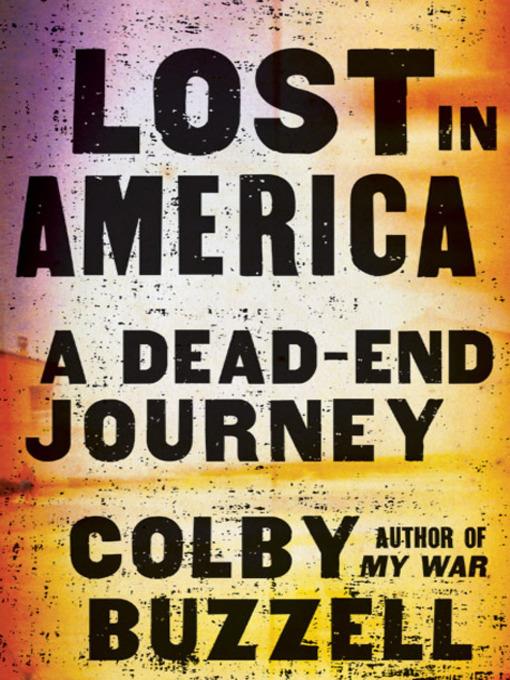
Lost in America
A Dead-End Journey
کتاب های مرتبط
- اطلاعات
- نقد و بررسی
- دیدگاه کاربران
نقد و بررسی

August 1, 2011
In his follow-up to My War: Killing Time in Iraq, Buzzell offers a bleak book, a dour and humorless account of a five-month trip through America following the spirit, if not the actual route, of Jack Kerouac's travels in On the Road. Buzzell doesn't help his case much by introducing himself in his first chapter as "a no-name writer" who claims to have left his wife and "week-old" son to take an assignment to "'write a love letter to Kerouac'" only to blow it off and wander aimlessly searching for "grime, alleys and alcohol." And after a beautiful tribute to his dying mother in chapter two, that's basically what Buzzell presents: a memoir of drinking his way from his California home through Utah, Wyoming, and Nebraska, taking day-labor jobs with no health care that remind him "what it is like to be an American"âeven though he seems to have a bottomless bank account with which to support himself. Other than a few casual and unexplained snipes at Barack Obama, Buzzell's unsurprising reporting doesn't rise above banal observations like "The lady working the front desk looked straight out of a David Lynch movie." When he ends up in Detroitâthe location for almost the book's entire final halfâhe realizes that "there was absolutely nothing original that I was doing." Unfortunately, the reader will have come to that realization well before that.

July 15, 2011
Life derails a commissioned meditation on Kerouac from a young American writer.
On assignment from his publishers to reappraise On the Road in the age of Obama, Buzzell (My War: Killing Time in Iraq, 2005) admits that while he adored Kerouac as a teenager and has several copies of the book, including a first edition, after a tour in Iraq, he had lost his passion for it. More to the point, he was distracted by two personal events: his mother's terminal illness and the birth of his son. At loose ends, in mourning and frankly wanting to postpone the responsibilities of married life and fatherhood, Buzzell decided to make a journey all his own, starting in San Francisco and following his whims to discover America on his own terms. His travels took him to Salt Lake City, Cheyenne, Denver, Omaha, Des Moines and, most enduringly (and endearingly) to Detroit before he winding up almost by chance in New York City. Along the way, he drove and lost money on an ice-cream truck, cleared land with a chainsaw for a new Safeway, sold used items at a Salvation Army and engaged in a lot of drinking and spending time in flophouses, his preferred mode of lodging. For nearly half the book, the narrative is as rootless and random as the author's wanderings at first. Buzzell was amusingly unimpressed with himself, and he lets the reader in on his self-doubts about the project at hand every step of the way. It's only in Detroit, where he openly assumed the role of writer, that he truly found his footing as a witty, fearless, sharp-eyed chronicler of America in decline. Time, Inc.'s purchase of a "safe house" in an upper-class enclave for its reporters to cover Detroit's devastation reminds him of Baghdad's Green Zone, where American reporters idled in high style between jaunts into the wrecked city to cover the war. Besides being intensely self-aware, Buzzell exhibits a Henry Miller–like talent for the memorable character sketch, and Detroit gives him plenty of subjects.
A slow starter with a strong finish.
(COPYRIGHT (2011) KIRKUS REVIEWS/NIELSEN BUSINESS MEDIA, INC. ALL RIGHTS RESERVED.)

September 15, 2011
Buzzell, previously known for his combat journal, My War: Killing Time in Iraq (2005), is a self-educated writer who clearly fancies himself in the tradition of Jack Kerouac (he repeatedly expresses his worship of On the Road). After the death of his mother and the birth of his son, he left his California home for a five-month odyssey across the U.S. Like Kerouac, he utilizes stream-of-conscious prose and frequent narrative shifts, which can be both fascinating and frustrating for readers. But the differences between him and Kerouac are significant. Kerouac was genuinely interested in his characters and could write with affection and compassion. Buzzell, on the other hand, seems interested primarily in himself and his demons, especially when he's stoned or drunk. Still, this is a journey that can be enjoyable and sometimes touching, especially when Buzzell relates his feelings of regret over his shortcomings as a son and a parent. A good addition to road literature.(Reprinted with permission of Booklist, copyright 2011, American Library Association.)

























دیدگاه کاربران